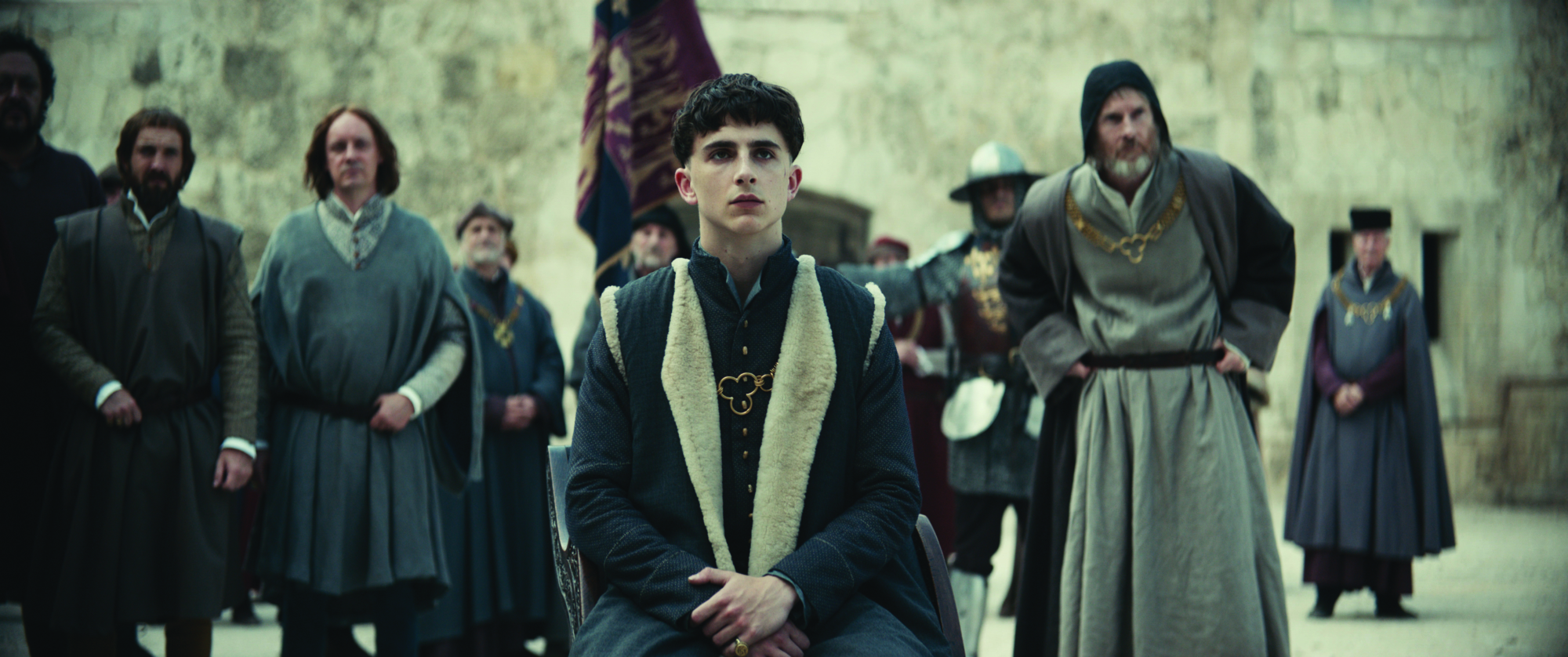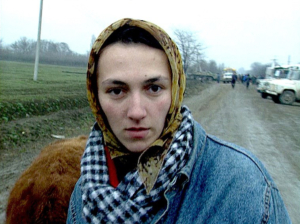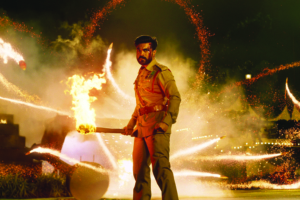The most memorable moment in The King (2019) – David Michôd’s de-Shakespeared telling of the coming of age of Henry V of England – comes when a blonde-wigged Robert Pattinson, playing the Dauphin of France as a louche, ridiculous, devilish dandy, insults the titular monarch (played by Timothée Chalamet) for being brave yet non-threatening. After pledging to slay his counterpart and bury him on French soil, the Dauphin says, ‘You know your balls must be big, no? Giant balls! Giant balls with a tiny cock!’ before breaking down into stagy laughter. It’s part of a wacky turn that finds R-Patz – one-time teen pin-up, now champion of visionary auteurs – speaking in a French accent seemingly beamed in from a sketch-comedy show. ‘In ways that I fully 100% endorse and love, that character is a Robert Pattinson creation,’ Michôd says. ‘The great fear always is that you end up with “Monty Python and the Holy Grail” and ridiculous French accents. But at the same time, I kind of needed his character to be kind of absurd.’[1]David Michôd, quoted in Marc Malkin, ‘The King Director David Michôd on Robert Pattinson’s Transformation into the Dauphin of France’, Variety, 3 October 2019, <https://variety.com/2019/film/actors/robert-pattinson-the-king-transformation-director-david-michod-1203356055/>, accessed 11 February 2020.
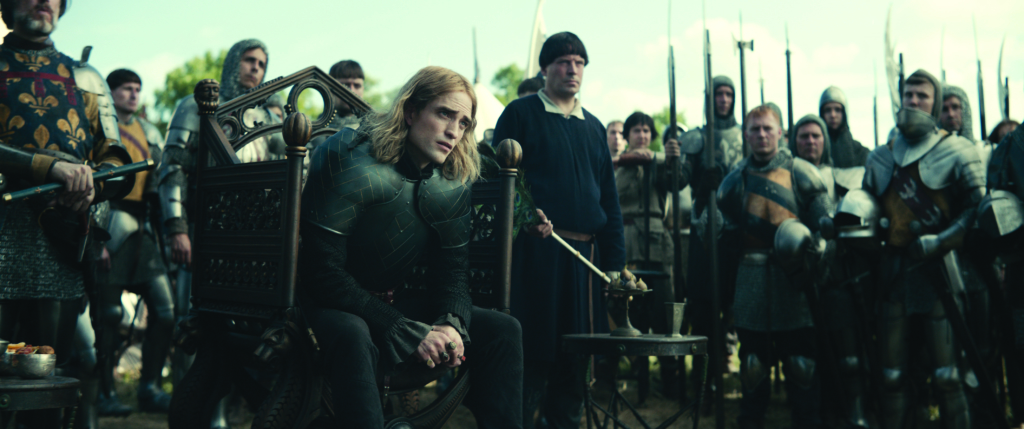
The most telling moment in The King, though, the one most symbolic of Michôd and co-writer/producer/star Joel Edgerton’s whole production, comes far earlier: before England and France are at war; even before the young Henry has ascended to the throne. In hoping to spare a battle between royal forces and a rebellious uprising – as well as his younger brother, baby-faced Prince Thomas (Dean-Charles Chapman), from having to lead men into battle – Prince Hal (as Henry is called in his pre-king days) challenges his rival, ‘Hotspur’ Percy (Tom Glynn-Carney), to a one-on-one duel. Whoever wins will claim victory for the whole battle; whoever loses will have their army surrender. Rather than resembling the dance of fencing, their subsequent sword fight feels like a street fight, if not – given the age of the opponents – a schoolyard slog. In full armour, they roll around in the dirt, exchange blunt blows with gloved fists, the fight guttural, animalistic, awkward. When Prince Hal finally finishes Hotspur off, it’s not via a slicing parry, but rather an in-close blow, driving a dagger into his neck while lying on top of him – this killing made gruesome, human, intimate. ‘I wanted that not to be about super fancy sword play,’ Michôd says, of the sequence. ‘I wanted it to be about two kids wearing trash cans, smashing the shit out of each other, heaving for breath and rolling around on the ground.’[2]David Michôd, quoted in Pat King, ‘Director David Michod on Re-working Shakespeare for The King’, Metro (US), 1 November 2019, <https://www.metro.us/entertainment/movies/David-Michod-The-King>, accessed 11 February 2020.
This suggests the tenor of The King – as does a line in which the Dauphin offers that he likes speaking English because it’s ‘simple and ugly’. This is, essentially, how Michôd and Edgerton have chosen to take a story synonymous with Shakespeare away from the realm of Shakespeare. The screenplay is officially based on the playwright’s ‘Henriad’ – specifically, Henry IV, Part 1, Henry IV, Part 2 and Henry V – but there’s a complete absence of Shakespearean language, of witty wordplay and stagy soliloquy. ‘We’d chosen not to use a single word of Shakespeare, even though the launching pad was my love of those three plays,’ offers Edgerton.[3]Joel Edgerton, in Steve ‘Frosty’ Weintraub, ‘Joel Edgerton Talks The King and Barry Jenkins’ The Underground Railroad’, Collider, 1 November 2019, <https://collider.com/joel-edgerton-the-king-the-underground-railroad-interview/>, accessed 11 February 2020. The actor had played Henry for Bell Shakespeare in Sydney back when he was twenty-five, and found it, as Michôd puts it, ‘a career-forming experience’.[4]Michôd, quoted in King, op. cit. Over the years, Michôd and Edgerton, both members of the production collective Blue-Tongue Films, had dreamt about returning to the Henriad. But Michôd wasn’t interested in a straight adaptation; given Shakespeare’s plays are meant ‘to be presented on an Elizabethan stage’, he believes they don’t lend themselves to a grand cinematic treatment.[5]ibid. Work on The King began in earnest in 2012, an unlikely genesis moment finding the pair, in the director’s words, ‘sitting on a beach in Lombok in board shorts, drinking pina coladas and just mapping out what this thing was going to be’.[6]David Michôd, quoted in Harry Windsor, ‘David Michôd’s The King’, The Monthly, 31 October 2019, <https://www.themonthly.com.au/blog/harry-windsor/2019/31/2019/1572481816/david-mich-d-s-king>, accessed 11 February 2020.
Where Henry initially rebelled against his heritage, eschewed his place in royal lineage and grappled with the morality of battle, soon he can be seen as just another bloodthirsty tyrant.
What it was going to be – and what it is – was, in part, a ‘simple and ugly’ depiction of early-fifteenth-century battlefields. Having satirised modern-day conflict with the impish War Machine (2017), Michôd is, again, assaulting the business of war. And just as its battles are a grim slog, the whole picture wears a largely sombre tone, and is photographed (by cinematographer Adam Arkapaw), in both gloomy rooms and on sodden battlefields, with a colour-leached palette resembling shades of soot, ash, pewter and decaying wood. Like War Machine, The King was co-produced with Brad Pitt’s production company Plan B, and ultimately bankrolled and brought to screens by Netflix. The resources of the streaming-service giant have allowed Michôd to bring a grand vision to screen, with glorious Nicholas Britell score, verdant European vistas, (literal) armies of extras, even actual catapults built for the production (of course, there’s irony in making a grand widescreen production thanks to a small-screen streaming service, but that’s for another thinkpiece). ‘I shot his very first short film which was a crew of like 20 people,’ Edgerton recounts, citing Michôd’s 2007 short Crossbow – which *fact check* was actually his second – ‘and there we were […] in Budapest in a field shooting the Battle of Agincourt with 200 armoured men and 80 horses.’[7]Joel Edgerton, quoted in Adam Woodward, ‘Joel Edgerton: “On a Scale of 1 to 10 This Project Was Spinal Tap”’, Little White Lies, 2 February 2019, <https://lwlies.com/interviews/joel-edgerton-boy-erased/>, accessed 11 February 2020.
What The King notably has, top-lining its grand production, are movie stars. That starts with Pattinson, who, seven years since the end of The Twilight Saga (2008–2012), is still a cultural phenomenon; during production on The King, he signed on to lead Matt Reeves’ 2021-due The Batman.[8]See Mike Fleming Jr, ‘Warner Bros Approves Robert Pattinson for The Batman’, Deadline, 31 May 2019, <https://deadline.com/20119/05/robert-pattinson-batman-wins-role-warner-bros-1202624926/>, accessed 11 February 2020. Following his work with auteurs like Werner Herzog, Claire Denis, Robert Eggers and the Safdie bros, in-the-know audiences will already be familiar with Pattinson as an arthouse titan, and Michôd has played an important part in that transition: his post-apocalyptic depiction of an Australian dystopia, The Rover (2014), was Pattinson’s first post-Twilight turn, and the first in which he really got loose. Ben Mendelsohn, whom Michôd previously directed in his local classic Animal Kingdom (2010), has spent his career getting loose; only, of late, he’s somehow been allowed to do so in Marvel products and Steven Spielberg movies. In The King, ‘Mendo’ plays a Henry IV ‘saturated with malice and mistrust’, ridden with sickness and in real need of washing his hair. Thomasin McKenzie, the young New Zealand actor (and Shortland Street veteran!) who broke out in Leave No Trace (Debra Granik, 2018), plays the new King Henry’s married-off sister, who, as teenaged Queen of Denmark, is wide-eyed and flinty, seemingly spooked by her own nascent experiences as a young monarch. Lily-Rose Depp, child of cinema celebrity and usually spoken of as ‘it girl’, is commanding in her last-act turn as Catherine of Valois, who’s betrothed to Henry in hopes of forging peace between warring nations and becomes the film’s unexpected, unwavering conscience, a vital voice of dissent.
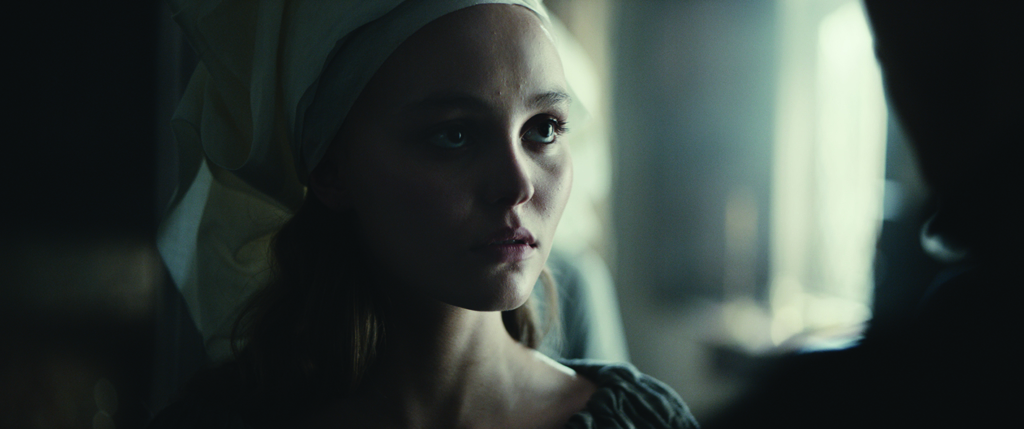
Edgerton himself has ascended to the rank of great film actor and unlikely Hollywood power player, his bogan-builder beginnings on early-2000s oz soap The Secret Life of Us having become a distant footnote. The young, pre-fame Edgerton played Henry; here, now, he’s Falstaff. Where the Bard’s Falstaff is comic relief, the character is remade in The King as war hero and still-brilliant battlefield tactician, Edgerton drawing from the real-life John Oldcastle, upon whom Shakespeare’s character was modelled. This Falstaff is bushily bearded, thickly brogued, thicker still around the middle (part of Edgerton’s preparation was to ‘eat a lot of burritos to get ready for the shoot’[9]Edgerton, quoted in Weintraub, op. cit. ) and, of course, a drunk. But he drinks due to the after-effects of war, which, contrastingly, he views with ‘grim sobriety’. Roped into the gig of Henry V’s military adviser, Falstaff’s full of calm and caution, his equanimity born from firsthand knowledge of the horrors of war. ‘For all our rejoice of courage and valour, nothing stains the soul more indelibly than killing,’ he counsels Hal – a drunken prince attempting to drown the horrors of his hand-to-hand murder of his rival Hotspur – in the film’s first act. ‘Never have I felt so vile as when I was standing victorious on a battlefield. The thrill of victory fades quickly. What lingers after is always ugly.’
And, leading this cast of stars, there’s Chalamet, the gifted tyro who was nominated for an Oscar, for his role in Luca Guadagnino’s 2017 queer classic Call Me by Your Name, at just twenty-two. A simple reading of this casting is that Michôd has taken a handsome heart-throb and stuck him with a bad haircut and a dark burden – which turns out to actually be true, and a decision that speaks to the greater themes of the film. ‘There was something really exciting to me about the idea of taking that kid from Call Me by Your Name and turning him into a tyrant,’ Michôd admits.[10]Michôd, quoted in King, op. cit. The director thinks that the throughline connecting his four otherwise-disparate features – crime, post-apocalyptic, war, historical – is that ‘they’re all movies about men. Delusional or naive men, coming to realize they’re wrong about something.’[11]David Michôd, quoted in Justin Quizon, ‘Timothée Chalamet & David Michôd Interview: The King’, Screen Rant, 29 October 2019, <https://screenrant.com/king-movie-timothee-chalamet-david-michod-interview/>, accessed 11 February 2020. Beyond chasing a kind of aesthetic ‘realism’ in this (re)telling of Henry V and its precursors, the director has deliberately muddied the moral waters of a story that has, so often, been recounted as a moment of unvarnished English glory. He delves more deeply into dark themes – the corruption of the Crown, the toxic nature of power, the dark nature of man – that can be seen as both Shakespearean and wholly contemporary.
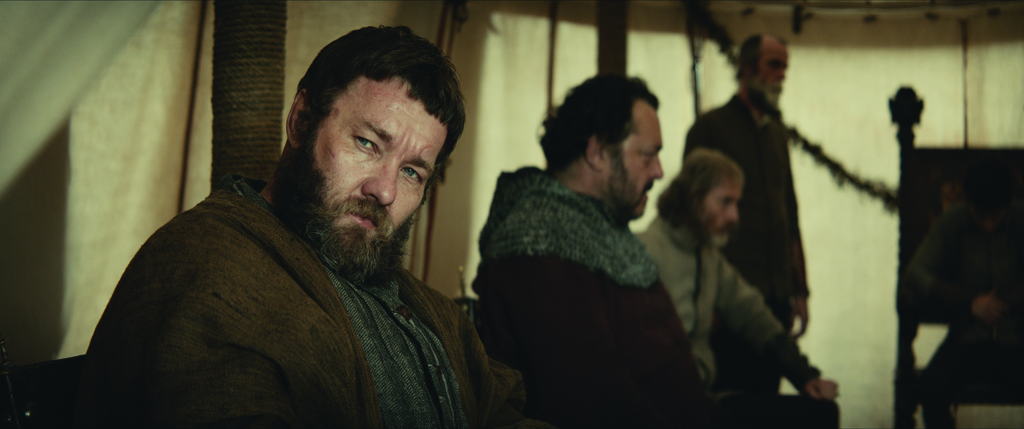
‘As a kid, I was drawn to the stories that most frightened me,’ Michôd says. ‘It’s not bogey men in hockey masks with chainsaws that frighten me anymore. It’s hubristic, delusional sociopaths in positions of great power.’[12]David Michôd, quoted in Max Cea, ‘Why the Director of The King Is Afraid of Delusional Men in Power’, GQ, 9 October 2019, <https://www.gq.com/story/the-director-of-the-king-loves-bad-haircuts>, accessed 11 February 2020. This latter sentence, and its sentiment, will surely call to mind Donald Trump, but the fact that the project was born in the Obama years – when its portrait of an idealist who loses his moral clarity in a position of power carried a different resonance – shows the ‘eternally relevant’ themes of the Henriad, how it reflects our ongoing human suffering at the hands of ‘cabals of men with agenda’[13]David Michôd, quoted in David Crow, ‘The King: How Timothée Chalamet and Joel Edgerton Rewrite Shakespeare’, Den of Geek, 29 October 2019, <https://www.denofgeek.com/us/movies/netflix/284127/the-king-timothee-chalamet-lily-rose-depp-joel-edgerton>, accessed 11 February 2020. – The King’s banal, non-specific title evoking the universality of this story. This king, having risen to the throne after the death of his father and brother, is immediately thrown into weighing up the necessity of war. At his very coronation, he receives a seemingly mocking gift from the Dauphin; a French assassin is soon arrested advancing towards the palace; and there are thwarted attempts at stirring up a pro-French uprising. At first, Henry resists war; but, with the words of manipulative adviser William Gascoigne (Sean Harris) in his ear, he soon commits to march on France, an operation bankrolled by the weirdly bellicose Archbishop of Canterbury (Andrew Havill). Plenty of influential, wealthy men are horrified that they’re now led by ‘a boy who but weeks ago was a drunken boor from the sewers of Eastcheap’, but war is always good for the coffers. The English sail across the channel, lay siege to Harfleur, march deeper into France, and eventually find victory in the famed Battle of Agincourt, where, despite being outnumbered, they succeed due to the smart tactics of Falstaff and the arrogance of the Dauphin. The opening salvos of the battle speak of historical re-enactment, before we’re plunged into the madness of war, the terror and disorientation of being in the fray. The climax of the fight, though, is played largely for comedy. With French forces reeling, the Dauphin challenges King Henry to a deathly duel on the battlefield, but, dressed in full armour, he can’t stand up in the slippery mud heap, and is swiftly dispatched by anonymous English grunts.
This narrative arc could be played for simple heroism, but it’s not. Henry’s inspiring speech on the eve of the Battle of Agincourt sounds convincing (and very hoorah-for-England), but it’s an act of an orator trying to convince himself. ‘[He] isn’t so sure of what he’s saying,’ Chalamet says. ‘There’s an insecurity to it. A realized delusion of maybe where he is. The inefficacy of the position of where he finds himself in.’[14]Timothée Chalamet, quoted in Quizon, op. cit. Like Pattinson’s performance, and the Dauphin’s on-screen death, there’s something ‘absurd’, Chalamet posits, in the very ‘idea of somebody at this age […] assuming leadership of a country’.[15]Timothée Chalamet, quoted in Crow, op. cit.
The King charts the swift transformation of a young man into a monarch, and then into a killer. When Henry dispassionately dispatches a host of French prisoners – ‘Kill them all,’ he orders, with nary a blink – we see that transformation as complete. Where he initially rebelled against his heritage, eschewed his place in royal lineage and grappled with the morality of battle, soon he can be seen as just another bloodthirsty tyrant: someone who’s had political opponents executed, used war as a forum for petty score-settling. Absolute power has corrupted absolutely.
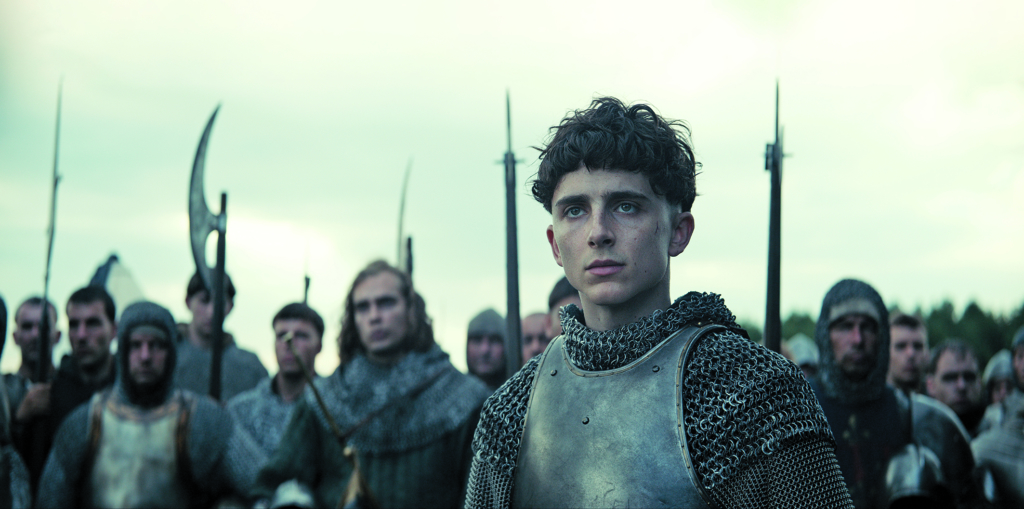
‘Before me now, all I see is a young and vain and foolish man so easily riled, so easily beguiled,’ says his wife-to-be, Catherine, on the eve of their nuptials, which are being staged in the hope of forging an alliance between the rival kingdoms of England and France. After the glories of battle and the sweet, cold dish of revenge, Catherine essentially serves as Henry’s harsh comedown: an unbowed adversary, grounding him in the cold realities of plainly spoken truth, her words as bracing as the film’s dressed-down, dark-and-dirty mise en scène. She minimises France’s supposed provocations, deems her Dauphin brother ‘stupid’, and judges that Henry has ‘no explanation’ for the war that he’s waged and the men who have died. ‘Do you feel a sense of achievement?’ she says, somewhat mockingly – quite the counter to Gascoigne’s claim that Henry has proven himself to be ‘one of England’s great kings.’ Catherine upends this familiar narrative with a simple statement: ‘All monarchy is illegitimate.’ Where all manner of popular entertainments – from historical dramas to fantasy sagas to, oh, say, animated musicals about lion cubs – are unquestioning in their depictions of hereditary rule and patriarchal succession, Michôd’s movie calls its monarchical power, and its own chronicle thereof, into question. It may wear the simple mantle of The King, but it’s a film unafraid of tarnishing its own crown.
https://www.netflix.com/au/title/80182016
Endnotes
| 1 | David Michôd, quoted in Marc Malkin, ‘The King Director David Michôd on Robert Pattinson’s Transformation into the Dauphin of France’, Variety, 3 October 2019, <https://variety.com/2019/film/actors/robert-pattinson-the-king-transformation-director-david-michod-1203356055/>, accessed 11 February 2020. |
|---|---|
| 2 | David Michôd, quoted in Pat King, ‘Director David Michod on Re-working Shakespeare for The King’, Metro (US), 1 November 2019, <https://www.metro.us/entertainment/movies/David-Michod-The-King>, accessed 11 February 2020. |
| 3 | Joel Edgerton, in Steve ‘Frosty’ Weintraub, ‘Joel Edgerton Talks The King and Barry Jenkins’ The Underground Railroad’, Collider, 1 November 2019, <https://collider.com/joel-edgerton-the-king-the-underground-railroad-interview/>, accessed 11 February 2020. |
| 4 | Michôd, quoted in King, op. cit. |
| 5 | ibid. |
| 6 | David Michôd, quoted in Harry Windsor, ‘David Michôd’s The King’, The Monthly, 31 October 2019, <https://www.themonthly.com.au/blog/harry-windsor/2019/31/2019/1572481816/david-mich-d-s-king>, accessed 11 February 2020. |
| 7 | Joel Edgerton, quoted in Adam Woodward, ‘Joel Edgerton: “On a Scale of 1 to 10 This Project Was Spinal Tap”’, Little White Lies, 2 February 2019, <https://lwlies.com/interviews/joel-edgerton-boy-erased/>, accessed 11 February 2020. |
| 8 | See Mike Fleming Jr, ‘Warner Bros Approves Robert Pattinson for The Batman’, Deadline, 31 May 2019, <https://deadline.com/20119/05/robert-pattinson-batman-wins-role-warner-bros-1202624926/>, accessed 11 February 2020. |
| 9 | Edgerton, quoted in Weintraub, op. cit. |
| 10 | Michôd, quoted in King, op. cit. |
| 11 | David Michôd, quoted in Justin Quizon, ‘Timothée Chalamet & David Michôd Interview: The King’, Screen Rant, 29 October 2019, <https://screenrant.com/king-movie-timothee-chalamet-david-michod-interview/>, accessed 11 February 2020. |
| 12 | David Michôd, quoted in Max Cea, ‘Why the Director of The King Is Afraid of Delusional Men in Power’, GQ, 9 October 2019, <https://www.gq.com/story/the-director-of-the-king-loves-bad-haircuts>, accessed 11 February 2020. |
| 13 | David Michôd, quoted in David Crow, ‘The King: How Timothée Chalamet and Joel Edgerton Rewrite Shakespeare’, Den of Geek, 29 October 2019, <https://www.denofgeek.com/us/movies/netflix/284127/the-king-timothee-chalamet-lily-rose-depp-joel-edgerton>, accessed 11 February 2020. |
| 14 | Timothée Chalamet, quoted in Quizon, op. cit. |
| 15 | Timothée Chalamet, quoted in Crow, op. cit. |
